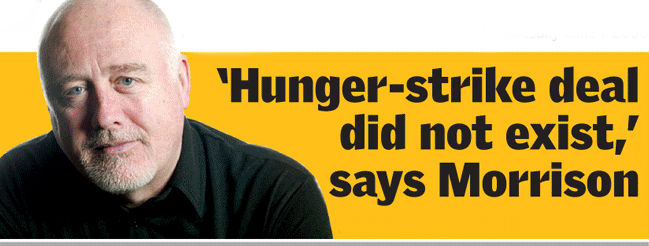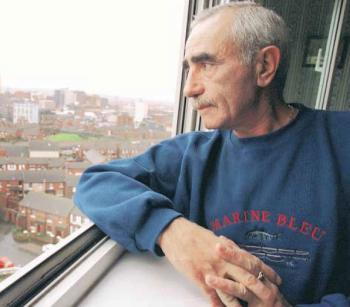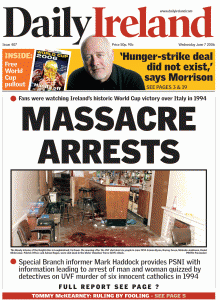Jan 7, 2011 Comments Off on UPDATED: Danny Morrison on the end of the 1980 hunger strike
UPDATED: Danny Morrison on the end of the 1980 hunger strike
Quotes from Danny Morrison, Brendan McFarlane, Laurence McKeown and Gerry Adams on the end of the 1980 hunger strike:
Although it is now well-known that Brendan Hughes ended the hunger strike unilaterally, without consulting his O/C Bobby Sands, we on the outside finessed the sequence of events for the sake of morale and at a midnight press conference merged the secret arrival of a British government document (promising a more enlightened prison regime: falsely, as it turned out) with the ending of the hunger strike.
It was either that or admit – which to the republican base was inconceivable – that Brendan had ended the strike without getting a thing.
Bobby – who turned out to be right – did not believe the British had any intention of working the unsecured promises contained in the document. But we begged him to put them to the test and that if the administration made things impossible then it could be claimed that the Brits were reneging.
Had the British taken the opportunity to resolve the prison crisis at that juncture history certainly would have been different. Instead, the British crowed victory in their briefings to the press and the prison administration felt smug, unbridled and under no obligation.
This bitter experience was to sear itself in the minds of the prisoners who were determined that there would never be a repeat of that scenario.
Tragically, the stage was set for 1981.
– Danny Morrison, Andersonstown News, 2011
Previously:
The political responsibility for the hunger strike, and the deaths that resulted from it, both inside and outside the prison, lies with Margaret Thatcher, who reneged on the deal which ended the first hunger strike. This bad faith and duplicity lead directly to the deaths of our friends and comrades in 1981.
– Brendan McFarlane, Andersonstown News, 2005
The 1981 hunger strike was a direct result of the 1980 hunger strike. The British government had said that it would not act under duress but would respond with a progressive and liberal prison regime once it ended. The prisoners called off the fast to save the life of Seán McKenna. However, the British immediately reneged on their promises. Because of this duplicity the hunger strikers of 1981 were adamant that any deal must be copperfastened.
– Danny Morrison, Irish Times, 2005
The government had promised the same at Christmas 1980 when the first hunger strike ended, only to renege on its promises. Because of this duplicity the prisoners in the second hunger strike wanted any agreement to be copper fastened.
– Danny Morrison, Daily Ireland, 2005
Yes, offers were made and discussed and clarified but when we tried to tie the British government down on a mechanism for ensuring they could not renege (as they had at the end of the first hunger strike) they procrastinated. The hunger strikers – as Laurence McKeown made clear the other day – “wanted definite confirmation, not vague promises of ‘regime change’.”
– Danny Morrison, Daily Ireland, 2005
Strangely, there was nothing new to me regarding what was on offer from the Brits back in 1981. Whether it was the ‘Mountain Climber’ or the Irish Commission for Justice and Peace, we wanted definite confirmation, not vague promises of ‘regime change’. We had all of that in December 1980.
– Laurence McKeown, An Phoblacht, 2005
The 1981 hunger strike came out of the 1980 hunger strike. The British sent a document to the prisoners which they claimed could be the basis for a settlement. However, the prisoners had already ended the strike before they received the document. The British reneged on their assurances almost immediately. That was why the second hunger strikers were to demand verification of any deal to end their hunger strike.
– Danny Morrison, Daily Ireland, 2006
In December 1980 the republican leadership on the outside was in contact with the British who claimed they were interested in a settlement. But before a document outlining a new regime arrived in the jail the hunger strike was called off by Brendan Hughes to save the life of the late Sean McKenna. The British, or sections of them, interpreted this as weakness. The prisoners ended their fast before a formal ‘signing off’. And the British then refused to implement the spirit of the document and reneged on the integrity of our exchanges. Their intransigence triggered a second hunger strike in which there was overwhelming suspicion of British motives among the hunger strikers, the other political prisoners, and their families and supporters on the outside.
– Gerry Adams, Irish News, 2009




 Denis Bradley, the link in Derry for more than two decades between MI5 and the IRA, claims that the IRA leadership had been handed a deal in early July 1981 – which eventually the prisoners did accept, but only after six more of their comrades had starved to death. Bradley’s account contradicts claims by loyal supporters of Gerry Adams that there had been no offer on the table in July that could have ended the hunger strike after four prisoners died.
Denis Bradley, the link in Derry for more than two decades between MI5 and the IRA, claims that the IRA leadership had been handed a deal in early July 1981 – which eventually the prisoners did accept, but only after six more of their comrades had starved to death. Bradley’s account contradicts claims by loyal supporters of Gerry Adams that there had been no offer on the table in July that could have ended the hunger strike after four prisoners died. It has withstood the blows of a million years, and will do so to the end.
It has withstood the blows of a million years, and will do so to the end.